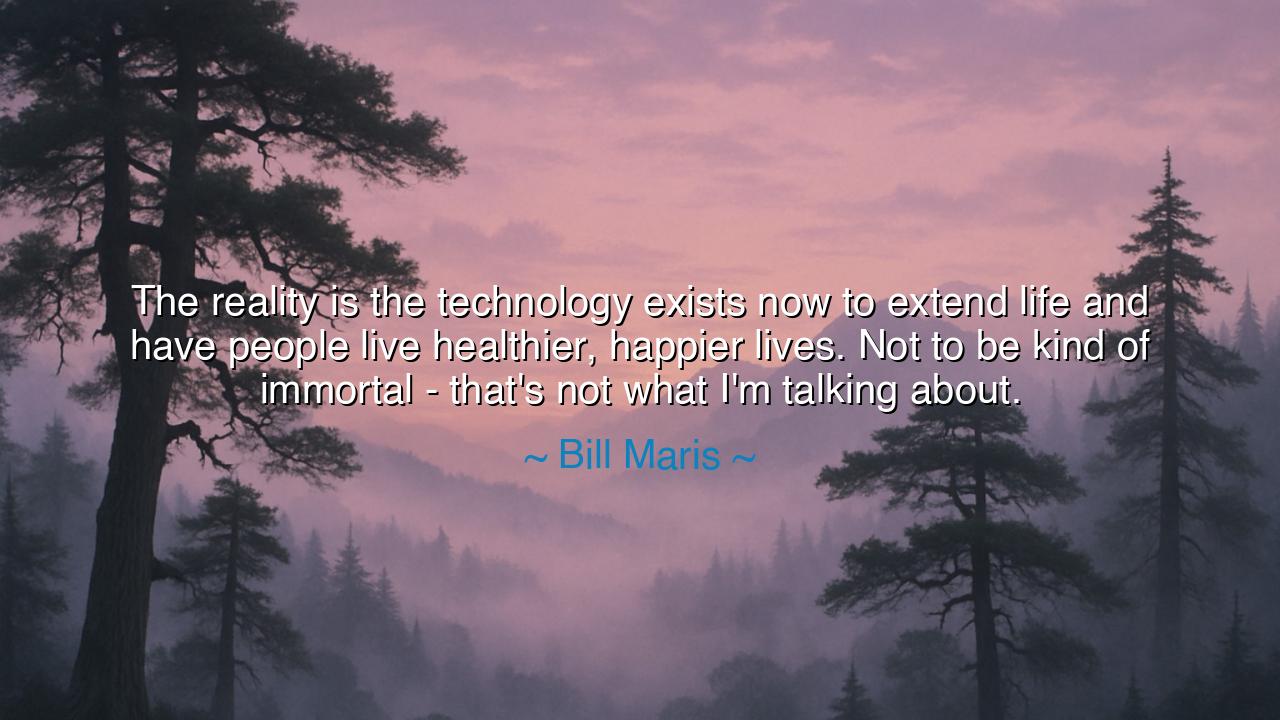
The reality is the technology exists now to extend life and have
The reality is the technology exists now to extend life and have people live healthier, happier lives. Not to be kind of immortal - that's not what I'm talking about.






Bill Maris, a man of vision who gazed upon the frontiers of medicine and science, once proclaimed: “The reality is the technology exists now to extend life and have people live healthier, happier lives. Not to be kind of immortal—that’s not what I’m talking about.” These words are filled with both hope and restraint. For he speaks not of fantasy or eternal escape from death, but of the tangible, earthly power that science already places in our hands: the power to ease suffering, to lengthen the thread of human years, and to enrich the time we are given with strength and joy.
The ancients dreamed of immortality. Gilgamesh wandered the earth searching for it; alchemists sought elixirs that would cheat decay; emperors built monuments so that their names would outlive their bodies. Yet all such quests ended in disappointment, for death remained unmoved. Maris’s words, however, remind us that while immortality may remain beyond our grasp, technology allows us to achieve something almost as profound: more years of life, lived not in weakness but in vigor, not in fear but in health.
History shows us the truth of this transformation. Only a century ago, diseases such as polio, smallpox, and tuberculosis cut down millions in their youth. Today, through vaccines, medicines, and sanitation, those same afflictions have been conquered or contained. Where once old age was frailty, now the span of life stretches longer, with people working, loving, and creating well into decades that once belonged only to decline. This is the technology Maris speaks of—the quiet revolution that has already reshaped what it means to be human.
Yet Maris is careful to temper his words. He says clearly: “Not to be kind of immortal.” For here lies the danger of hubris, the same arrogance that once tempted Icarus to fly too close to the sun. If we chase immortality as gods, we risk losing our humanity. Life’s meaning is not only in its length, but in the way it is lived, the love it carries, and the legacy it leaves. To extend life is noble, but to seek to escape death entirely may strip us of humility and wisdom. Thus, Maris teaches balance: use the gifts of science, but do not forget the truths of mortality.
We may see a mirror of this in the story of Methuselah, said to have lived nearly a thousand years. Though long-lived, he is not remembered for what he did with those years, only for their number. Contrast this with Socrates, who lived far fewer years, but filled them with teaching, courage, and a death embraced with dignity. The lesson is clear: happier lives and healthier lives matter more than endless lives. The quality of time surpasses the sheer quantity of it.
What, then, shall we do with the power that technology has given us? We must pursue health as a gift, not merely for ourselves but for our communities. Exercise, medicine, mindfulness, and kindness—these are as much tools of longevity as machines and pills. We must invest in cures for diseases, in clean environments, in the pursuit of knowledge that benefits all. For to extend life is not enough; we must extend well-being, joy, and the chance for every soul to flourish.
So, dear listener, take Maris’s wisdom as a guide: do not chase the false dream of immortality, but embrace the real miracles of health and renewal that lie within reach. Use technology not to deny death, but to enrich life. Cherish the years you are given, and use them well—building, loving, and creating. For in the end, the true measure of life is not its length alone, but the fullness with which it is lived. Better a long life of joy than an endless life without meaning.






AAdministratorAdministrator
Welcome, honored guests. Please leave a comment, we will respond soon